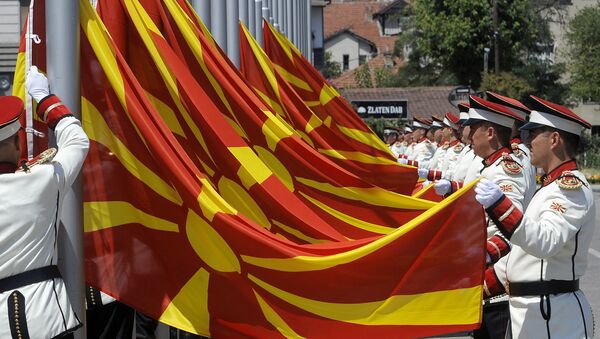“The Balkan states’ neutral status is seen by NATO as a hindrance to its plans of using the peninsula as a major jumping-off ground both on the Middle Eastern and Russian tracks,” Dusan Prorokovic told Sputnik Serbia.
The formal reason for Mr. Kodzias’ trip is to try and settle the longstanding squabble over the name of the Macedonian state.
As Greece's northern province is called Macedonia, Athens opposes Skopje's use of the name. It recognizes the country as "the Former Yugoslav Republic of Macedonia (FYROM),” and has been blocking its possible EU and NATO membership.
During a recent meeting with his Macedonian counterpart Nikola Dimitrov in Athens, Nikos Kotzias said that “we want to see Macedonia in the EU and NATO, but not before we have settled the issue of its name.”
Dusan Prorokovic mentioned two previous attempts to change Macedonia’s present name to either Upper Macedonia or Northern Macedonia.
“Macedonia is the name its people have identified themselves with over the past 25 years. Any attempts to change this could lead to unpredictable results,” Prorokovic warned.
He added that this could come in the form of protest rallies and boycotts aimed at unseating the Social-Democratic government of Prime Minister Zoran Zaev, the initiator of a quick compromise with Greece and fast-tracking Macedonia’s membership in NATO.
Dusan Prorokovic warned that Macedonia’s accession into the alliance would lead to the situation that now exists in Montenegro.
“Montenegro is a divided country now where there is no consensus between the elite, let alone the society as a whole. There is no such consensus in Macedonia either. The US could use its European allies to push Macedonia into NATO but this could have extremely negative consequences for the country,” Prorokovic emphasized.
In June, Macedonian Prime Minister Zoran Zaev expressed readiness to make a concession over the state's name and join NATO as the Former Yugoslav Republic of Macedonia (FYROM), which Greece insists on, in order to accelerate the country's EU integration process.
Macedonia joined NATO's Partnership for Peace in 1995 and the Membership Action Plan in 1999, a program that offers advice, assistance and support to countries seeking to join the alliance.




